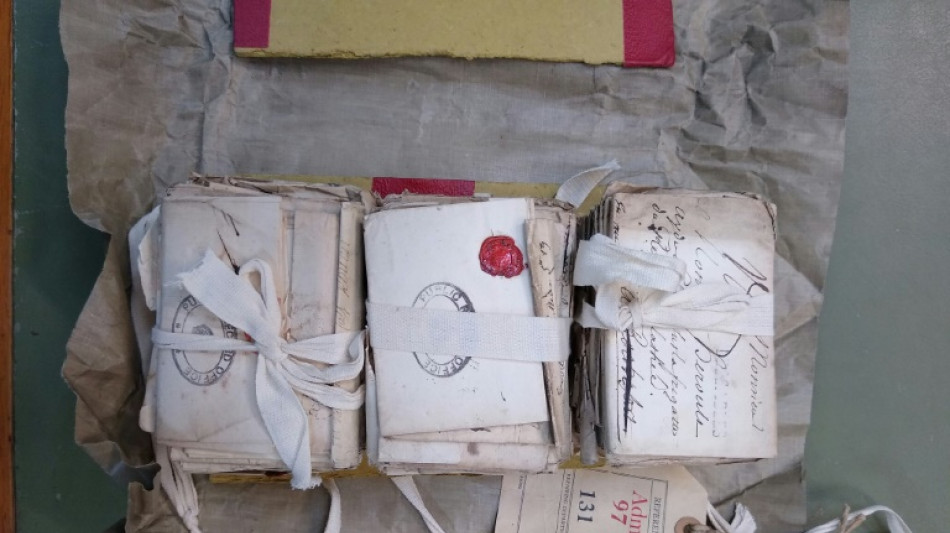
-
 Music world mourns Ghana's Ebo Taylor, founding father of highlife
Music world mourns Ghana's Ebo Taylor, founding father of highlife
-
HK mogul's ex-workers 'broke down in tears' as they watched sentencing

-
 JD Vance set for Armenia, Azerbaijan trip
JD Vance set for Armenia, Azerbaijan trip
-
Sydney police deploy pepper spray as Israeli president's visit sparks protests

-
 EU warns Meta it must open up WhatsApp to rival AI chatbots
EU warns Meta it must open up WhatsApp to rival AI chatbots
-
Scotland spoil Italy's T20 World Cup debut with big win

-
 Stocks track Wall St rally as Tokyo hits record on Takaichi win
Stocks track Wall St rally as Tokyo hits record on Takaichi win
-
Israeli president says 'we will overcome evil' at Bondi Beach

-
 Munsey leads Scotland to 207-4 against Italy at T20 World Cup
Munsey leads Scotland to 207-4 against Italy at T20 World Cup
-
Venezuela's Machado says ally 'kidnapped' after his release

-
 Japan restarts world's biggest nuclear plant again
Japan restarts world's biggest nuclear plant again
-
Bangladesh poll rivals rally on final day of campaign

-
 Third impeachment case filed against Philippine VP Duterte
Third impeachment case filed against Philippine VP Duterte
-
Wallaby winger Nawaqanitawase heads to Japan

-
 Thailand's Anutin rides wave of nationalism to election victory
Thailand's Anutin rides wave of nationalism to election victory
-
Venezuela's Machado says ally kidnapped by armed men after his release

-
 Maye longs for do-over as record Super Bowl bid ends in misery
Maye longs for do-over as record Super Bowl bid ends in misery
-
Seahawks' Walker rushes to Super Bowl MVP honors

-
 Darnold basks in 'special journey' to Super Bowl glory
Darnold basks in 'special journey' to Super Bowl glory
-
Japan's Takaichi may struggle to soothe voters and markets

-
 Bad Bunny celebrates Puerto Rico at Super Bowl, angering Trump
Bad Bunny celebrates Puerto Rico at Super Bowl, angering Trump
-
Seahawks soar to Super Bowl win over Patriots

-
 'Want to go home': Indonesian crew abandoned off Africa demand wages
'Want to go home': Indonesian crew abandoned off Africa demand wages
-
Asian stocks track Wall St rally as Tokyo hits record on Takaichi win

-
 Hong Kong sentences pro-democracy mogul Jimmy Lai to 20 years in jail
Hong Kong sentences pro-democracy mogul Jimmy Lai to 20 years in jail
-
Bad Bunny celebrates Puerto Rico in joyous Super Bowl halftime show

-
 Three prominent opposition figures released in Venezuela
Three prominent opposition figures released in Venezuela
-
Japan PM Takaichi basks in historic election triumph

-
 Israeli president says 'we shall overcome this evil' at Bondi Beach
Israeli president says 'we shall overcome this evil' at Bondi Beach
-
'Flood' of disinformation ahead of Bangladesh election

-
 Arguments to begin in key US social media addiction trial
Arguments to begin in key US social media addiction trial
-
Gotterup tops Matsuyama in playoff to win Phoenix Open

-
 New Zealand's Christchurch mosque killer appeals conviction
New Zealand's Christchurch mosque killer appeals conviction
-
Leonard's 41 leads Clippers over T-Wolves, Knicks cruise

-
 Patriots-Seahawks Super Bowl approaches as politics swirl
Patriots-Seahawks Super Bowl approaches as politics swirl
-
Trump says China's Xi to visit US 'toward the end of the year'

-
 Real Madrid edge Valencia to stay on Barca's tail, Atletico slump
Real Madrid edge Valencia to stay on Barca's tail, Atletico slump
-
Malinin keeps USA golden in Olympic figure skating team event

-
 Lebanon building collapse toll rises to 9: civil defence
Lebanon building collapse toll rises to 9: civil defence
-
Real Madrid keep pressure on Barca with tight win at Valencia

-
 Dimarco helps Inter to eight-point lead in Serie A, Juve stumble
Dimarco helps Inter to eight-point lead in Serie A, Juve stumble
-
PSG trounce Marseille to move back top of Ligue 1

-
 Two prominent opposition figures released in Venezuela
Two prominent opposition figures released in Venezuela
-
Hong Kong to sentence media mogul Jimmy Lai in national security trial

-
 Lillard will try to match record with third NBA 3-Point title
Lillard will try to match record with third NBA 3-Point title
-
Vonn breaks leg as crashes out in brutal end to Olympic dream

-
 Malinin enters the fray as Japan lead USA in Olympics team skating
Malinin enters the fray as Japan lead USA in Olympics team skating
-
Thailand's Anutin readies for coalition talks after election win

-
 Fans arrive for Patriots-Seahawks Super Bowl as politics swirl
Fans arrive for Patriots-Seahawks Super Bowl as politics swirl
-
'Send Help' repeats as N.America box office champ


Confiscated French love letters finally opened after 265 years
Undelivered letters written to French sailors during an 18th century war between Britain and France have finally been opened and studied -- after more than 250 years gathering dust.
The unread letters have provided a rare insight into the lives of sailors and their families in the 1700s, from the wife of a senior naval officer to an elderly mother chastising her son for not writing.
The Royal Navy seized the messages during the Seven Years' War, a global conflict that ended in 1763 that saw Britain and France lead rival alliances.
"I could spend the night writing to you... I am your forever faithful wife," wrote Marie Dubosc to her husband Louis Chamberlain, the first lieutenant of a French warship in 1758.
"Good night, my dear friend. It is midnight. I think it is time for me to rest."
Unknown to Marie, her husband's ship, the Galatee, had been captured by the British, researchers at the University of Cambridge found.
Louis never received the letter and his wife died the following year, almost certainly before he was released by the British.
In another missive dated January 27, 1758, the mother of young sailor Nicolas Quesnel from Normandy takes him to task about his lack of communication.
"I think more about you than you about me... In any case I wish you a happy new year filled with blessings of the Lord," 61-year-old Marguerite wrote in a letter probably dictated to someone else.
"I think I am for the tomb, I have been ill for three weeks. Give my compliments to Varin (a shipmate), it is only his wife who gives me your news," she added.
The Galatee was captured by the British en route from Bordeaux to Quebec in 1758.
- 'Universal human experiences' -
British Admiralty officials at the time deemed the letters of no military significance and the vast majority languished in the archives, unopened, until they attracted the attention of Cambridge history professor Renaud Morieux.
"I only ordered the box out of curiosity," said Morieux, whose findings were published on Tuesday in the journal "Annales. Histoire, Sciences Sociales".
Presented with three piles of very small letters held together by ribbon, Morieux said he "realised I was the first person to read these very personal messages since they were written".
"Their intended recipients didn't get that chance. It was very emotional," he said.
Morieux identified every member of the Galatee's 181-strong crew, with letters addressed to a quarter of them, and also carried out genealogical research into the men and their correspondents.
In 1758 alone a third of France's sailors were captured by the British.
Over the whole period of the Seven Years' War nearly 65,000 were imprisoned by the British.
Some died from disease and malnutrition although others were released.
Letters would have been the only means their families had of trying to contact them, said Morieux.
"These letters are about universal human experiences, they're not unique to France or the 18th century," he added.
"They reveal how we all cope with major life challenges.
"When we are separated from loved ones by events beyond our control like the pandemic or wars, we have to work out how to stay in touch, how to reassure, care for people and keep the passion alive," said the historian.
"Today we have Zoom and WhatsApp. In the 18th century, people only had letters but what they wrote about feels very familiar."
I.Yassin--SF-PST




